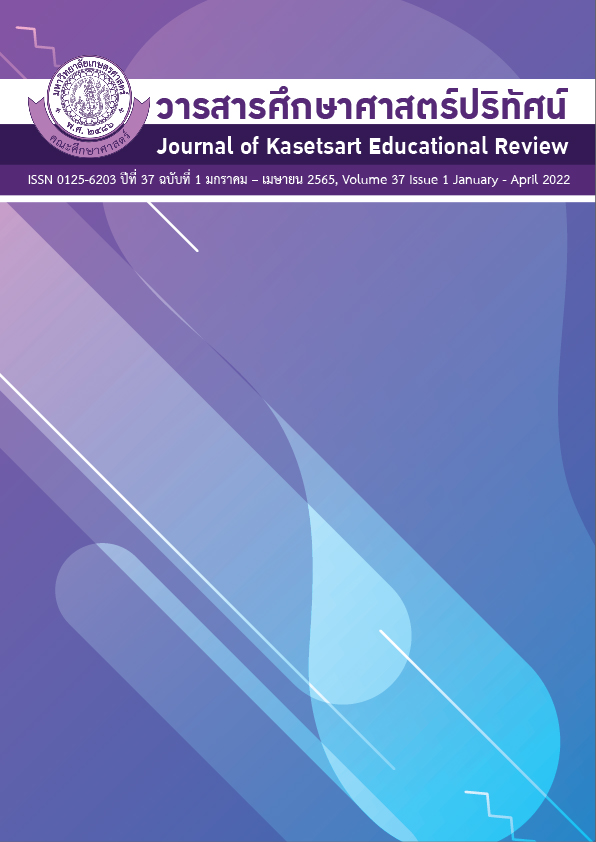การพัฒนาสมรรถนะการแก้ปัญหาแบบร่วมมือของผู้เรียนระดับชั้นมัธยมศึกษาปีที่ 5 ด้วยการจัดกิจกรรมตามแนวสะเต็มศึกษา
คำสำคัญ:
สมรรถนะการแก้ปัญหาแบบร่วมมือ, กิจกรรมแบบสะเต็มศึกษา, ผู้เรียนระดับมัธยมศึกษาตอนปลาย, งานวิจัยเชิงคุณภาพบทคัดย่อ
การวิจัยในครั้งนี้มีวัตถุประสงค์เพื่อศึกษาสมรรถนะการแก้ปัญหาแบบร่วมมือของนักเรียน เรื่องกรด-เบส หลังการจัดการเรียนรู้แบบสะเต็มศึกษาให้แก่ผู้เรียนระดับชั้นมัธยมศึกษาปีที่ 5 แผนการเรียนวิทยาศาสตร์ และเทคโนโลยี จำนวน 30 คน เครื่องมือที่ใช้ในการเก็บรวบรวมข้อมูล ได้แก่ แบบวัดสมรรถนะการแก้ปัญหาแบบร่วมมือ และแบบบันทึกการเรียนรู้ของผู้เรียน ทำการวิเคราะห์ข้อมูลในเชิงปริมาณ โดยหาความถี่และร้อยละของพฤติกรรมบ่งชี้ในแต่ละองค์ประกอบของสมรรถนะการแก้ปัญหาแบบร่วมมือตามกรอบประเมินนักเรียนนานาชาติ (PISA) จากนั้นวิเคราะห์ข้อมูลในเชิงคุณภาพโดยการวิเคราะห์เนื้อหา ผลการวิจัยพบว่านักเรียนมีทักษะทางด้านปัญญาสูงที่สุดในด้านการสำรวจและทำความเข้าใจเกี่ยวกับปัญหา (ร้อยละ 91) และมีทักษะทางสังคมสูงสุดในด้านการสร้างและรักษาระเบียบของกลุ่ม (ร้อยละ 95) อีกทั้งยังพบว่าการรับรู้ระดับความสามารถของตนเองนั้นส่งผลต่อความสามารถในการคิด วางแผนและดำเนินการแก้ปัญหาที่แตกต่างกันออกไป นอกจากนี้การที่นักเรียนมีมุมมองและความเข้าใจเกี่ยวกับการแก้ปัญหาว่าจะต้องมีวิธีการที่ตายตัวส่งผลต่อความสามารถของผู้เรียนในการค้นหารูปแบบของการมีปฏิสัมพันธ์ในการทำงานร่วมกันเพื่อแก้ปัญหาตามเป้าหมาย
เอกสารอ้างอิง
Andrews, J., J., & Rapp, N., D. (2014). Partner Characteristics and Social Contagion: Does Group Composition Matter? Applied Cognitive Psychology, 28(4), 505-517. doi: 10.1002/acp.3024
Breiner, M. J., Johnson, C. C., Harkness, S. S. & Koehler, M. C. (2012). What is STEM? A discussion about Conceptions of STEM in education and partnerships. School Science and Mathematics, 112(1), 3-11. doi: 10.1111/j.1949-8594.2011.00109.x
Brown, S. J., Collins, A., & Duguid, P. (1989). Situated Cognition and the Culture of Learning. Educational Researcher, 18(1), 32-42. doi:10.3102/0013189x018001032
Chen, L., Yoshimatsu, N., Goda, Y., Okudo, F., Taniguchi, Y., Oi, M., Konomi, S., Shimada, A., Ogata, H. & Yamada, M. (2019). Direction of collaborative problem solving based STEM learning by learning analytics approach. Research and Practice in Technology Enhanced Learning, 14(24), doi:10.1186/s41039-019-0119-y
Cholsin, J., Kijakuakul, S. & Chaiyasith, W. C. (2018). The Action Research for Developing Learning Management on Stoichiometry Based on STEM Approach Emphasized Engineering Design Process to Promote Collaborative Problem Solving Competency. Journal of Education Naresuan University, 20(2), 32-46.
Daugherty, M. K., & Wicklein, R. (1993). Mathematics, Science, and Technology Teachers' Perceptions of Technology Education. Journal of Technology Education, 4(2), 28-43. doi:10.21061/jte.v4i2.a.3
Graesser, A. C., Forsyth, C. M., & Foltz, P. (2017). Assessing conversation quality, reasoning, and problem solving with computer agents, In Csapó, B. and J. Funke (eds.), The Nature of Problem Solving: Using Research to Inspire 21st Century Learning, OECD Publishing,
Hesse, F., Care, E., Buder, J., Sassenberg, K., & Griffin, P. (2015). A Framework for Teachable Collaborative Problem Solving Skills. In P. Griffin & E. Care (Eds.), Assessment and Teaching of 21st Century Skills: Methods and Approach (pp. 37-56). Dordrecht: Springer Netherlands.
Kelley, T. R., & Knowles, J. G. (2016). A conceptual framework for integrated STEM education. International Journal of STEM Education, 3(1), 1-11. doi:10.1186/s40594-016-0046-z
Lien, Y. C. N., Wu, W. J. C. & Lu, Y. L. (2020). How Well Do Teachers Predict Students’ Actions in Solving an Ill-defined Problem on STEM Education: A Solution Using Sequential Pattern Mining. IEEE Access, 8, 134976-134986. doi: 10.1109/ACCESS.2020.3010168
Lin, K. Y., Yu, K. C., Hsiao, H. S., Chu, Y. H., Chang, Y. S. & Chien, Y. H. (2015). Design of an assessment system for collaborative problem solving in STEM education. Journal of Computers in Education, 2(3), 301-322. doi: 10.1007/s40692-015-0038-x
Mayer, R. E., & Wittrock, M. C. (2006). Problem solving. In Handbook of educational psychology. (pp. 287-303). Mahwah, NJ, US: Lawrence Erlbaum Associates Publishers.
Neadratsamee, C., Kijkuakul, S. & Sananmuang, R. (2019). An Action Research on Development of Stem Education Based on Engineering Design Process for Promoting Collaborative Problem Solving Competencies on Environmental Chemistry of 10th Grade Students. Journal of Rangsit University: Teaching & Learning, 13(1), 29-45. [in Thai]
OECD. (2017a). PISA 2015 Assessment and Analytical Framework.
OECD. (2017b). PISA 2015 Results (Volume V).
Phasuk, P. (2016). Enhacing Collaborative Problem Solving Competency in Topic “Digestive System” for Grade 10 Students by Using Learning Management Through Deeper Scaffolding Framework (Master’s Thesis). Retrieved from Thesis M.Ed. in Biology, Naraesuan University, [in Thai]
Raju, P.K. & Clayson, A. (2010). The future of STEM education: An analysis of two national reports. Journal of STEM Education: Innovations and Research, 11(5 & 6), 25-28.
Rosen, Y. (2015). Computer-based Assessment of Collaborative Problem Solving: Exploring the Feasibility of Human-to-Agent Approach. International Journal of Artificial Intelligence in Education, 25, 380-406.
Shieh, R. S. & Chang, W. (2014). Fostering Student’s Creative and Problem Solving Skills Through a Hands-On Activity. Journal of Baltic Science Education, 13(5), 650-661.
Taveebot, P., Chanunan, S. & Klamtet, J. (2016). Development of Collaborative Problem Solving skills on enhancing gifted students’ in the topic of Stoichiometry using Creative Problem Solving. Division of Research And Innovation, 22(1), 937-948. [in Thai]
Trilling, B., & Fadel, C. (2009). 21st century skills: Learning for life in our times: (pp.1-19). John Wiley & Sons.
ดาวน์โหลด
เผยแพร่แล้ว
ฉบับ
ประเภทบทความ
สัญญาอนุญาต
ลิขสิทธิ์ (c) 2022 วารสารศึกษาศาสตร์ปริทัศน์

อนุญาตภายใต้เงื่อนไข Creative Commons Attribution-NonCommercial-NoDerivatives 4.0 International License.
บทความทุกบทความเป็นลิขสิทธิ์ของวารสารคณะศึกษาศาสตร์ มหาวิทยาลัยเกษตรศาสตร์ วิทยาเขตบางเขน
วารสารศึกษาศาสตร์ปริทัศน์ (Kasetsart Educational Review)






